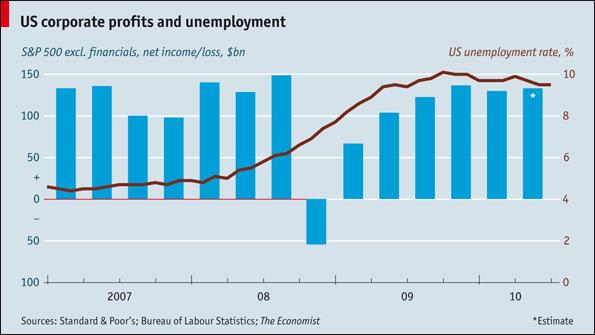Russia's economy:Boom to bust and worse
(ロシア経済:ブームからバストへ、そして…)
Economist.com:Dec 16th 2008
The state of the economy in Russia looks worse with each passing day
ロシアの経済情勢は日々悪化しているようだ。
ECONOMIC growth and political stability: those were the two proudest achievements of Vladimir Putin and his ex-KGB associates in the eight years since they gained control of Russia. Now the economy is looking wobbly—industrial output in November slumped by 8.7% compared with a year earlier, according to figures published on Tuesday December 16th—the big question is whether the regime’s political control will crack too.
経済成長と政治安定。
それこそがウラジーミル・プーチンと彼の元KGBの仲間達が、ロシアを掌握してからの8年間で達成した、最も誇れる二大業績だった。
今、経済はぐらついているようであり(12月16日火曜日に公表されたデータによれば、11月の工業生産は前年に比べて8.7%減少したとのこと)、同政権の政治的支配力も崩れるのではないか、というのが大きな問題だ。
The rouble—a rock-hard currency since the oil price started to rise—is losing value at an accelerating rate, down by 3% this week against a basket of currencies. It has lost around 15% of its value since the summer. Even so, Russia’s huge foreign-currency reserves are steadily shrinking as the authorities defend the rouble. They are down by more than a quarter, or around $160 billion, from their August peak of $600 billion.
石油価格が上昇し始めて以来非常に強かったルーブルは、加速度的に値下がりしており、恩讐はバスケット通貨に対して3%値下がりした。
夏から見れば15%ほども安くなってしまった。
それでも、当局がルーブル防衛する中、ロシアが抱える巨額の外貨準備は着々と減っている。
実はピークだった8月の6,000億ドルから1/4、もしくは約1,600億ドルほど減っているのだ。
Russia has been hit by a double blow. One is a collapse in the oil price. Urals crude is trading around $44 a barrel, whereas Russia’s budget had pencilled in an oil price of $70. The other is the credit crunch which means an end to cheap loans for an economy that had become used to a flood of petroroubles.
ロシアは往復ビンタを食らっている。
一つは石油価格の暴落だ。
ウラル原油はバレル44ドル程度で取引されているが、ロシアの国家予算の前提は70ドルだ。
もう一つは信用収縮である。
これは怒涛のオイルマネーに慣れ切った経済のために、もう低金利ローンが得られなくなることを意味している。
The stockmarket has fallen by some 70% since its peak in May. Lay-offs are mounting. Western credit ratings agencies are downgrading Russian banks; earlier this month Standard & Poor’s downgraded Russia’s sovereign debt for the first time in nearly a decade. Industrial production is plummeting: this week marked the steepest fall since the crisis of 1998. Oleg Vyugin, a former deputy finance minister, reckons that 2009 may see GDP shrinking by as much as 4%. (The Economist Intelligence Unit, more optimistically, has cut its growth forecast from 3.7% to 3%.)
株式市場は5月のピーク以来、約70%も値下がりしてしまった。
人員削減も進んでいる。
西側の信用格付機関は、ロシア系銀行を格下げしており、今月先にはS&Pがロシア国債の格付を10年ぶりに引き下げた。
工業生産も落ち込んでいて、今週は1998年以来最も激しい落ち込みとなった。
オレグ・ヴィユーギン元副財務相は、2009年はGDPが最大4%縮小するだろうとしている。
(エコノミスト・インテリジェンス・ユニットはもう少し楽観的で、予想成長率を3.7%から3%に下方修正するに留まった。)
Finding an economic-policy mix to deal with that is a daunting task. Russia’s main macroeconomic problem of the past two years—inflation—is far from vanquished: it was down only slightly to 13.8% in November. But a far bigger problem is maintaining growth in an economy that during the boom years borrowed recklessly and used the money for higher living standards rather than diversification.
これに対処するための経済政策パッケージを見つけ出すことは至難の業だ。
ロシアの過去2年間の主なマクロ経済問題(インフレ)は、殆ど克服されていない。
11月は13.8%へと微減しただけだ。
しかし、ブームの時期に無謀な借金をして、これを多様化するのではなくセレブ生活のために使ってしまった経済において、遥かに大きな問題は経済成長維持である。
The rouble's depreciation does cut Russia’s current-account deficit, by making imports pricier. It takes some of the strain off the budget. But it does not help much else. Russia’s underlying uncompetitiveness was disguised by the oil boom. Now it is exposed.
ルーブル安は輸入を高価にすることで、確かにロシアの経常赤字を減らしてくれる。
予算への負担は若干弱まるだろう。
しかし他の方面では大した役に立たない。
ロシアの根本的な競争力の欠如は、石油ブームの仮面で誤魔化されてきたのだ。
今、それが暴かれたのである。
Nor do bail-outs seem to be working. A $200 billion programme is helping Kremlin-linked companies stay afloat (and also consolidating the authorities’ control of the economy). But much of the money that was meant to unblock the financial system is instead going offshore. Confidence is shrivelling.
救済策も上手く行っていないように見える。
2,000億ドルを投じた救済策は、クレムリンつながりの企業が生き延びるのを助けている(ついでに政府の経済への支配力も強化している)。
しかし金融システムの目詰まりを取り除くためのものであるはずの資金の殆どは、本来の役目を果たす代わりにオフショアに流れてしまっている。
信頼は萎み続けている。
A rise in the oil price might buy the Kremlin some time. President Dmitry Medvedev last week suggested that Russia might even join OPEC, the oil-producers’ cartel. It is unclear how that would square with the nominally private ownership of most of Russia’s oil industry, or Russia’s membership of the G8 club of rich industrialised countries. OPEC members themselves may be unconvinced by Russia’s new-found enthusiasm.
石油価格の上昇は、クレムリンの時間稼ぎになるかもしれない。
ディミートリ・メドヴェージェフ大統領は先週、ロシアのOPEC入りもあるかもしれない、と示唆した。
名目上は民間とされる殆どのロシア石油産業、またはロシアのG8メンバーシップと、どのように折り合いをつけるのかは明らかではない。
OPEC加盟国自体、ロシアが新たに見せているやる気に、不信感を持っているかもしれない。
Public discontent is beginning to simmer. The problem is less the tiny self-proclaimed opposition, but spontaneous protests by citizens fed up with incompetent and arbitrary behaviour. A protest by drivers in the Russian far east brought a nervy response from official Kremlin media. The regime’s popularity rested on a combination of higher living standards and selective repression. The economic crisis has weakened the effect of the former. The latter is one of the few options left. The signs are ominous. Memorial, a group that champions the cause of truth about the Stalin era, has had its computers seized in a police raid. The Soldiers’ Mothers Committee, which campaigns against conscription, says law-enforcement officials have asked its staff to prove that their offices are not used for drug-dealing.
世論の不満も高まり始めている。
問題はちっぽけな自称野党というよりも、無能さと勝手な振る舞いに飽き飽きした市民が、散発的に起こす抗議運動だ。
ロシア極東で起こった、運転手のデモは、政府系メディアの神経質な反応をもたらした。
政権の支持率は、生活水準向上と選択的弾圧の組み合わせに基づいている。
経済危機は生活水準向上の効果を弱めてしまった。
後者、つまり選択的弾圧は、数少ない残されたオプションの一つだ。
不吉なサインである。
スターリン時代の真実を求める団体メモリアルは、警察に捜索されPCを押収されてしまった。
徴兵制度反対運動を行う、ソルジャーズ・マザーズ・コミティーは、司法当局者がスタッフに、事務所が麻薬取引に利用されていないことを証明するよう求められた、と語る。
For now, the economic crisis is scarcely discussed in Russia’s mainstream media, which has come under steadily tighter control since Mr Putin came to power. That is not likely to persuade Russians that the authorities have everything under control.
今の所、プーチン氏が政権を掌握して以来、徐々に厳しい管理の対象とされてきたロシアの主流メディアでは、経済危機は殆ど話し合われていない。
これでは、当局は何もかも把握管理していると言っても、ロシア人は納得しないだろう。
















